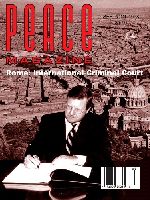
Peace Magazine Sept-Oct 1998, page 29. Some rights reserved.
Search for other articles by J.M.Dykstra here
Trudy Govier. Mcgill-Queens University Press 1997, 257 Pp.
This book is a treatise on trust that includes a tirade againstcynicism (people who don't trust) and an endorsement of civilsociety (people who do trust). The first chapters tell us at trustexists when our emotions and beliefs lead us to expect behavior ofsome kind by others. When we say we trust friends, we mean that weexpect them to act with our well-being in mind; a friends does notbetray a confidence or steal one's job. And when we trust someoneto take care of a pet, we expect her to act in our interest andalso trust that she is competent to care for the animal.
Without trust we could not live at all; emotionally andphysically it is impossible to be an empiricist. A baby cannot buttrust its parents and other grownups. For their part, grown-upsmust trust other drivers on the road, road maps, and the money weearn and spend. We must trust manufacturers to give us safe foodsand drugs. We must trust politicians, bureaucrats, teachers, andothers whose identities are unknown. We need to trust theinformation others provide in order to be educated, informed,warned of danger, or alerted to opportunity. We have to trusttitles such as Doctor, Professor, or Dentist. And by trusting weprosper.
Contrasted with the trusting qualities just mentioned, Govierpaints a stark picture of what happens when trust is absent ormisplaced. She writes of the Meech Lake Accord and later events asa case in which trust was lacking; she discusses the Fabricantshootings at Concordia University as having resulted from ProfessorFabricant's belief that some of his colleagues were actingunprofessionally; she refers to the Tylenol crisis as a case wheretrust was misplaced. We also learn of the African tribe called 1kwho can hardly tell the truth and have been known to refusenecessities of life to babies.
The example of the 1k is important for two reasons. Govier showsthat even the 1k have to trust each other and that strangers musttrust the 1k to use their words properly or else they would not beable to communicate either the truth or lies. More importantly, thedescription of this tribe serves as the reader's first exposure tothe concepts of "high trust" and "low trust" societies.
Chapter Seven argues that high trust societies can engage inmore collective activities and take advantage of laborspecialization and economies of scale more than their low trusttotalitarian counterparts. Trusting societies develop civilconventions of behavior. Because of this, says Govier, civildemocracies fare better than totalitarian regimes. She contraststhe failures of the Soviet empire and the East German regimes tothe successes of Western democracies. In a chapter on internationalrelations she argues against realists who believe internationalorder is based on narrow self-interest and war. She notes thatinternational trade requires trust; that internationalorganizations such as the U.N. and NGOs are based on trust andcivility; and that international law is alive and well.
The last chapter, a diatribe against "mocking cynicism,"examines those who passively distrust any person or propositionthat goes beyond narrow self-interest, deceit, dishonesty, anddistrust. Govier here asserts that humans are by nature hopeful,civil, and not individualistic. She points to collective,cooperative movements such as the environmental movement thatabound in Western societies, while criticizing Western emphasis onindividualism and competition as misplaced. She exhorts us towardhopeful and trusting ways as antidotes for spiritual, political,and economic shortcomings.
Nevertheless, I see the book as lacklustre and many of herfindings as specious. Not that it matters much, but was not ancientEgypt at certain times in its history rich, collective in importantways, and totalitarian?
It is possible to trust too much. Is that not what the Russianpeople did with the Bolsheviks? Is that not what you do when youeat fresh fruit in certain countries? Is that not what happened inthe Tylenol case? Beyond certain limits, are there not diminishingreturns to trust, to collective enterprises, and even to hope?Surely, the answer is to balance the trust that benefits us againstthe healthy distrust that protects us from hazards. For example,safety and environmental regulations are based on a healthydistrust of the marketplace, government, and the military.
Reviewed by J.M. Dykstra of Toronto.

Peace Magazine Sept-Oct 1998, page 29. Some rights reserved.
Search for other articles by J.M.Dykstra here